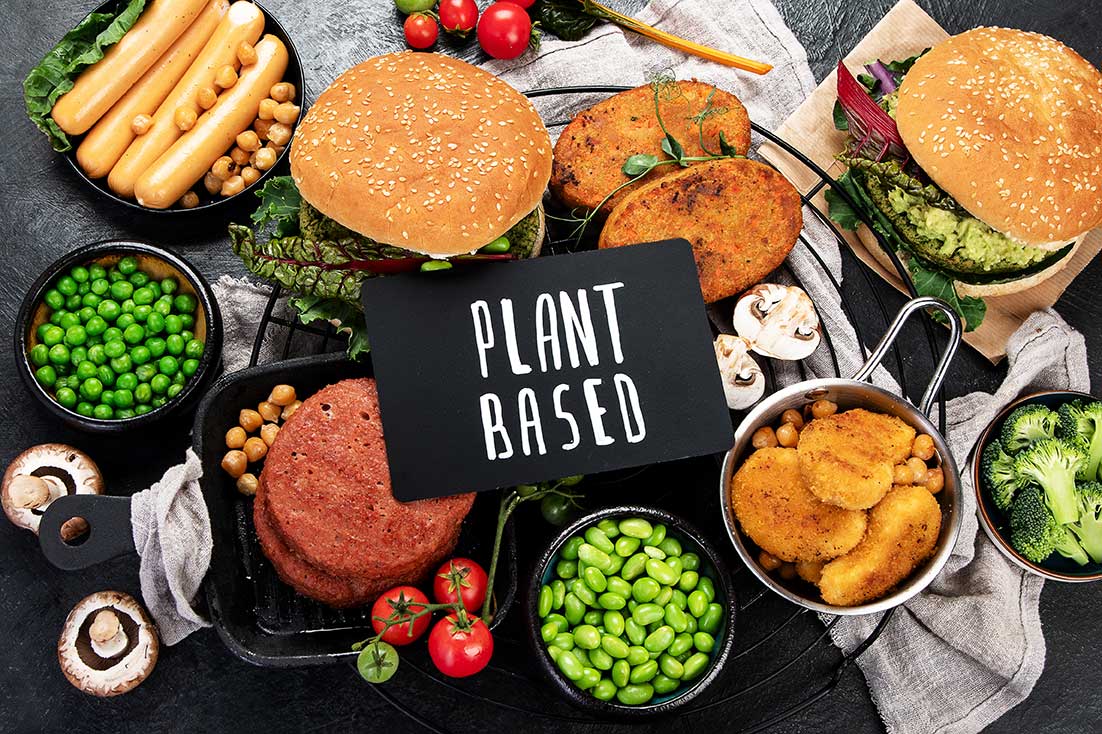The Best Sugar Free Sauces for Diabetics Living a Plant-Based Lifestyle
Wiki Article
All Concerning Healthy And Balanced Food: Benefits of Taking On Plant Based Alternatives
The conversation bordering plant-based diet plans has gotten considerable focus in the last few years. Many people are discovering the prospective wellness benefits, nutritional benefits, and environmental effects related to these dietary choices. As individuals end up being much more aware of their food's impact on well-being and sustainability, concerns develop concerning the practicalities of taking on such a lifestyle. What specific changes can one anticipate, and exactly how might these choices reshape not only personal wellness yet also the world's future?Comprehending Plant-Based Diet Plans
Although several individuals connect plant-based diet regimens primarily with vegetarianism or veganism, these diet plans can encompass a vast array of consuming patterns that prioritize whole, minimally refined plant foods. Such diet plans frequently consist of fruits, vegetables, entire grains, beans, seeds, and nuts, while restricting or eliminating pet items. This adaptability permits individuals to customize their dietary choices according to individual choices and dietary demands. Some may adopt a largely plant-based diet while still periodically consuming meat or dairy products, commonly described as a flexitarian technique. The focus remains on integrating more plant foods, which can lead to a diverse array of tastes and meals. Understanding these numerous analyses of plant-based consuming is important for valuing its availability and appeal in modern food culture.Wellness Perks of Plant-Based Foods
The health and wellness benefits of plant-based foods are considerable, providing a nutrient density benefit that supports general wellness. Study suggests that these foods can enhance heart health and wellness and play a necessary function in reliable weight administration. By incorporating extra plant-based alternatives, people might boost their dietary options and promote lasting health and wellness.Nutrient Density Benefit
Nutrient density plays a crucial function in the health and wellness advantages of plant-based foods, making them a compelling choice for those looking for a balanced diet plan. Plant-based foods, such as fruits, veggies, vegetables, nuts, and entire grains, are frequently abundant in important vitamins, minerals, and antioxidants while being lower in calories. This high nutrient thickness permits individuals to take in less calories while still fulfilling their nutritional needs. In addition, these foods are loaded with dietary fiber, promoting digestion health and aiding in weight management. By incorporating nutrient-dense plant-based alternatives, consumers can enhance their total health, sustain their body immune systems, and lower the danger of chronic conditions. Ultimately, the nutrient density of plant-based foods underscores their relevance in a health-conscious way of life.Heart Wellness Renovation

Weight Management Assistance
Along with advertising heart health, a plant-based diet plan can substantially help in weight monitoring. This nutritional strategy emphasizes whole foods such as fruits, vegetables, legumes, nuts, and entire grains, which are usually lower in calories and higher in fiber compared to animal-based products. The high fiber content assists increase satiety, reducing overall calorie consumption. Plant-based diets are commonly rich in necessary nutrients while reduced in harmful fats, making it easier to keep a healthy weight. Research suggests that people who adopt a plant-based way of life often tend to have reduced body mass indexes (BMIs) and experience more successful weight reduction compared to those that eat meat-heavy diet regimens. Embracing plant-based choices is a calculated choice for effective weight administration.
Nutritional Worth of Plant-Based Ingredients
Plant-based components are rich in necessary nutrients, supplying a varied range of vitamins, minerals, and antioxidants that add to general health and wellness. A comparison of healthy protein sources discloses that while animal products are often watched as superior, numerous plant-based options give sufficient protein and other useful substances. Recognizing the nutritional value of these components can help individuals make notified dietary choices.Necessary Nutrients in Plants
Nutrient-rich active ingredients discovered in plants provide a diverse array of vital minerals and vitamins that contribute substantially to overall wellness. These active ingredients are abundant in vitamins A, C, and K, which sustain immune function, vision, and blood clot, respectively. Furthermore, plants give important minerals such as calcium, magnesium, and potassium, vital for heart health, muscle feature, and bone toughness. The existence of fiber in plant-based foods aids food digestion and advertises a healthy digestive tract microbiome. Antioxidants, discovered perfectly in fruits and vegetables, help combat oxidative anxiety and decrease inflammation. Several plant foods are low in calories yet high in nutrients, making them an excellent option for those looking for to preserve a healthy weight while guaranteeing excellent nutrient intake.
Contrasting Healthy Protein Sources
Healthy protein sources vary significantly in their nutritional accounts, with plant-based ingredients supplying distinct benefits. Unlike animal healthy proteins, which usually consist of saturated fats and cholesterol, plant healthy proteins often tend to be lower in these unhealthy elements. Legumes, nuts, seeds, and entire grains are abundant in necessary amino acids, fiber, vitamins, and minerals. As an example, lentils offer high protein content along with significant iron and folate, while quinoa is a full protein, supplying all nine necessary amino acids. Furthermore, plant-based healthy proteins are typically accompanied by antioxidants and phytochemicals that sustain total health. The shift to plant-based healthy protein resources not just enhances nutritional consumption yet additionally straightens with lasting nutritional practices, reducing environmental impact and advertising long-term wellness advantages.Environmental Effect of Plant-Based Eating
As awareness of climate change grows, many individuals are exploring lasting dietary choices that can considerably reduce their ecological footprint. Plant-based consuming has become a significant factor to reducing greenhouse gas emissions, which are primarily connected with livestock manufacturing. The farming of fruits, grains, veggies, and legumes usually requires fewer resources, such as water and land, compared to animal farming. Furthermore, plant-based diets can lead to decreased logging, as less land is required for grazing livestock or expanding animal feed. By moving in the direction of plant-based alternatives, customers can sustain biodiversity and promote healthier ecological communities. Overall, welcoming plant-based consuming not just benefits personal wellness yet also stands for an important action towards ecological sustainability and conservation initiatives.Overcoming Common Misconceptions
While numerous individuals recognize the advantages of a plant-based diet regimen, a number of misconceptions usually deter them from completely welcoming this way of living. A typical belief is that plant-based diets do not have sufficient protein; nonetheless, numerous plant sources, such as vegetables, nuts, and tofu, supply ample healthy protein. Additionally, some presume that this diet regimen is expensive, when in truth, staples like beans, rice, and seasonal vegetables can be rather budget-friendly. An additional mistaken belief is that plant-based consuming is extremely restrictive, whereas it in fact supplies a diverse array of foods and tastes. Many stress that a plant-based diet might lead to shortages, yet with appropriate planning, individuals can acquire all essential nutrients, including vitamins and minerals, while taking pleasure in a large selection of tasty dishes.Tips for Transitioning to a Plant-Based Lifestyle
Making the change to a plant-based way of life can be an enhancing experience, though it often needs some guidance to browse the first changes. People are motivated to start progressively, including even more fruits, veggies, legumes, and whole grains into their meals while decreasing meat and dairy usage. Meal preparation is necessary; preparing a regular menu can help relieve the change and protect against last-minute undesirable choices. Exploring cooking techniques and new dishes can additionally preserve and improve the experience excitement regarding plant-based eating. Furthermore, joining assistance groups or areas can give motivation and share beneficial suggestions. Lastly, staying click to investigate informed about nourishment assurances get more well balanced meals, avoiding deficiencies while promoting a healthy and balanced, rewarding plant-based way of life.Delicious Plant-Based Meal Ideas
Exploring tasty plant-based meal concepts can motivate people to welcome a more nutritious diet. One preferred alternative is a hearty quinoa salad, featuring cherry tomatoes, cucumber, and a vibrant lemon-tahini clothing. One more fave is a savory lentil stew, packed with carrots, celery, and great smelling herbs, excellent for a soothing dinner. For morning meal, overnight oats made with almond milk, chia seeds, and covered with fresh berries offer a nourishing beginning to the day. Furthermore, a dynamic vegetable stir-fry with tofu and a selection of colorful veggies can be a fast yet pleasing meal. Lastly, creamy avocado toast on whole-grain bread, sprinkled with seasonings and seeds, provides a basic yet flavorful treat. These dishes display the selection and splendor of plant-based eating.
Often Asked Questions
Can a Plant-Based Diet Plan Give Sufficient Healthy Protein?
The concern of whether a plant-based diet plan can give enough protein prevails. Countless resources, consisting of vegetables, nuts, seeds, and whole grains, can satisfy protein requires successfully, sustaining a nourishing and well balanced diet regimen for individuals.Are Plant-Based Diet Regimens Suitable for Children?
The suitability of plant-based diets for youngsters depends upon cautious preparation. Adequate nutrients need to be guaranteed, including proteins, minerals, and vitamins. With proper assistance, such diet regimens can support healthy and balanced growth and growth in kids.Just how Do I Eat Out on a Plant-Based Diet plan?
Eating in restaurants on a plant-based diet plan involves looking for restaurants with varied food selections, requesting adjustments, and checking out vegan-friendly options. Planning in advance and communicating nutritional choices can improve the dining experience while preserving dietary choices.What Are Common Irritants in Plant-Based Foods?
Common allergens in plant-based foods include soy, gluten, nuts, and seeds - BBQ Sauces. People adhering to a plant-based diet regimen must recognize these irritants and review tags very carefully to avoid negative reactions and ensure safe consumptionCan Plant-Based Diets Aid With Weight Reduction?
Study suggests that taking on a plant-based diet may facilitate weight reduction due to its commonly lower calorie density and greater fiber content. This combination can boost satiety, helping people manage their calorie consumption successfully. Several individuals link plant-based diets primarily with vegetarianism or veganism, these diet plans can incorporate a wide range of eating patterns that prioritize entire, minimally refined plant foods. Nutrient density plays a necessary duty in the health benefits of plant-based foods, making them a compelling selection for those seeking a well balanced diet plan. Plant-based discover here diet plans have actually been revealed to substantially boost heart health and wellness, as they often have elements that sustain cardiovascular function. In enhancement to promoting heart health and wellness, a plant-based diet plan can substantially aid in weight management. A typical idea is that plant-based diet regimens lack sufficient healthy protein; however, many plant sources, such as beans, nuts, and tofu, supply adequate protein.Report this wiki page